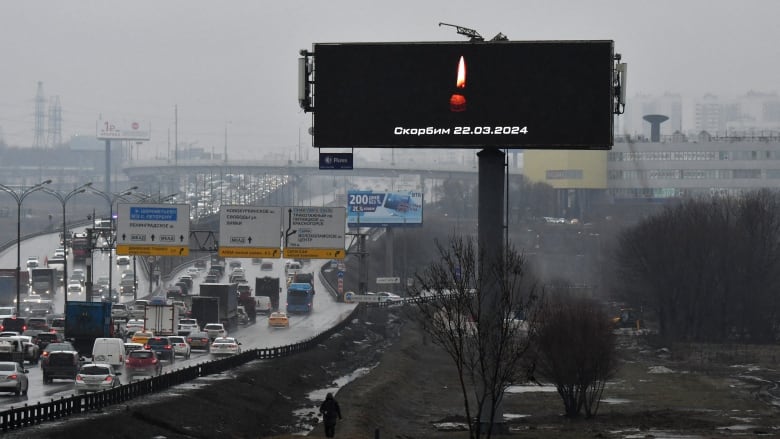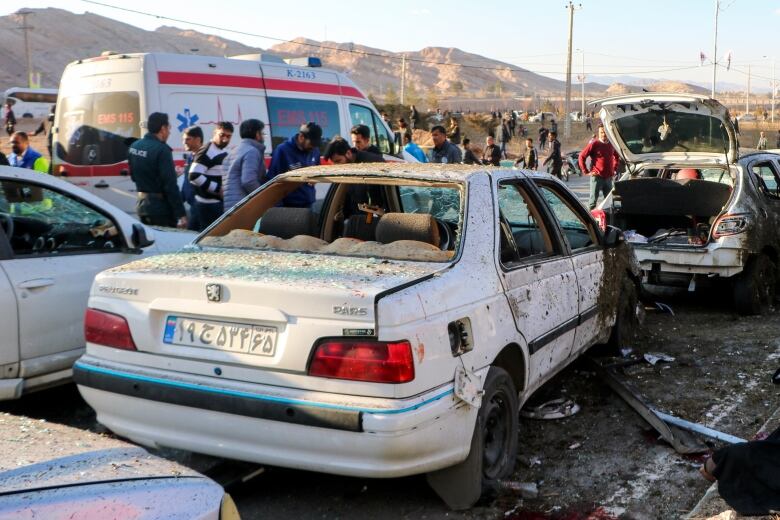The threat of ISIS-K and its interests in Russia
Militant group claimed responsibility for Friday's attack on Moscow concert hall

Within hours of a deadly gun assault on a suburban Moscow concert hall on Friday, ISIS's Afghanistan affiliate, ISIS-K,said it was behind the violence that killed more than 130 people according to Russian officials.
The United States says it has intelligence thatconfirms theclaim of responsibility. Security analysts concur the claim is plausible andlargely consistent with how the militant group operates.On Saturday, U.S. National Security Council spokesperson Adrienne Watson said ISIS "bears sole responsibility" for the attack.
Here's a brief look at why Russia is dealing with an ongoing ISIS-K threat.
Origins of ISIS-K
Roughly a decade old, Islamic State Khorasan (ISIS-K) is namedafter an old term for the region that included parts of Iran, Turkmenistan and Afghanistan.
After emerging in eastern Afghanistan, ISIS-Kquickly established a reputation for extreme brutality.
One of the most active regional affiliates of the ISIS militant group, ISIS-K has seen its membership decline since peaking in about2018. The Taliban and U.S. forces inflicted heavy losses.
But the U.S.sees the group as an ongoing threat.
Gen. Michael Kurilla, commander of U.S. Central Command, told Congress last March that ISIS-K was quickly developing the ability to conduct "external operations" in Europe and Asia.
He predicted it would be able to attack U.S. and Western interests outside Afghanistan "in as little as six months and with little to no warning."
Attacks within the U.S. itself were less likely, he said.
Why Russia?
While the attack by ISIS-K in Russia on Friday was a dramatic escalation, experts said the group has opposed Russian President Vladimir Putin in recent years.
"ISIS-K has been fixated on Russia for the past two years, frequently criticizing Putin in its propaganda," said Colin Clarke, a senior research fellowwiththe Soufan Center, a New York-based research group.
Michael Kugelman, director of the South Asia Institute atthe Washington-based Wilson Center, said ISIS-K "sees Russia as being complicit in activities that regularly oppress Muslims."He added that the group also counts as members a number of Central Asian militants with their own grievances against Moscow.
Daniel Byman, a senior fellow with the Transnational Threats Project at the Centerfor Strategic and International Studies in Washington, agreedthat from ISIS'spoint of view, "Russia has always been a top enemy."
He and other experts pointed to Russia's involvement in Syria as a point of contention for the militants.
As the Russians have supported Syrian President Bashar al-Assad, "they have been attacking ISIS in Syria," Andrew Rasiulis of the Canadian Global Affairs Institute told CBC News on Friday.
Other ISIS-K attacks
ISIS-K has a history of attacks, including against mosques, inside and outside of Afghanistan.
In September 2022, ISIS-K militants claimed responsibility for a deadly suicide bombing at the Russian Embassy in Kabul, Afghanistan's capital.
The group was also responsible for an attack on Kabul's international airport in 2021 that killed 13 U.S. troops and scores of civilians during the chaotic U.S. evacuation from the country.

In early January, ISIS-K claimed responsibility for twinbombings in Kerman, Iran, thattargeted a memorial gathering for a slain Iranian military official. Scores of people were killed.
U.S. officials said they had warned Iranian officials about a looming attack, in advance of the bombings as they also did ahead of the recentevents in Moscow.
William Courtney, a former U.S. ambassador to Kazakhstan and Georgia, said he sees several possibilities why warnings from Washington may not have necessarily been heeded in Moscow.
"They just may have discounted it because they see us as the enemy," said Courtney, who also previouslyserved as a special assistant to the U.S. president on Russia, Ukraine and Eurasia. But he said it's also possible that the information did not flow smoothly through government channels in Moscow.
Embattled, not eradicated
Byman said Washington's warnings to both Russia and Irandemonstrate a level of remote capability the U.S. has to monitor ISIS-K and other militant groups, despite U.S. troopshaving physically exited Afghanistan in 2021.
The Taliban is also putting pressure on them,butthey remain an issue. "These groups are embattled but not completely destroyed," he said.

The U.S. has said its ability to develop intelligence against extremist groups in Afghanistan such as ISIS-K has been reduced since the withdrawal of troops from the country in 2021.
The U.S. military has said it can see the "broad contours" of an impending attack, but it does not have the specific detail it did previously.
With files from the CBC's Geoff Nixon













_(720p).jpg)


 OFFICIAL HD MUSIC VIDEO.jpg)
.jpg)








































































































